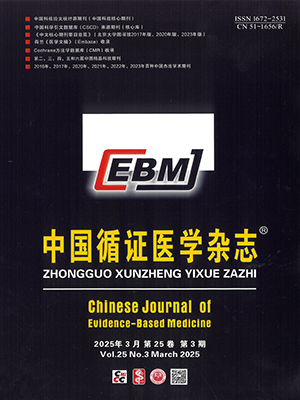| 1. |
Guyatt GH, Oxman AD, Kunz R, et al. GRADE guidelines: 2. Framing the question and deciding on important outcomes. J Clin Epidemiol, 2011, 64(4): 395-400.
|
| 2. |
Institute of Medicine. Clinical practice guidelines we can trust. Washington (DC): The National Academies Press, 2011: 16-25.
|
| 3. |
Murphy MK, Black NA, Lamping DL, et al. Consensus development methods, and their use in clinical guideline development. Health Tech Assess, 1998, 2(3): 1-88.
|
| 4. |
Chapple M, Murphy R. The nominal group technique: extending the evaluation of students' teaching and learning experiences. Assess Eval High Edu, 1996, 21(2): 147-160.
|
| 5. |
Custer RL, Scarcella JA, Stewart BR. The modified Delphi technique a rotational modification. J Vcat Tech Edu, 1999, 15(2): 1-10.
|
| 6. |
Oxman AD, Schünemann HJ, Fretheim A. Improving the use of research evidence in guideline development: 2. Priority setting. Health Res Policy Syst, 2006, 4: 14.
|
| 7. |
Atkins D, Perez-Padilla R, Macnee W, et al. Priority setting in guideline development: article 2 in integrating and coordinating efforts in COPD guideline development. An official ATS/ERS workshop report. Proc Am Thorac Soc, 2012, 9(5): 225-228.
|
| 8. |
El-Harakeh A, Morsi RZ, Fadlallah R, et al. Prioritization approaches in the development of health practice guidelines: a systematic review. BMC Health Serv Res, 2019, 19(1): 692.
|
| 9. |
Speckman RA, Friedly JL. Asking structured, answerable clinical questions using the population, intervention/comparator, outcome (PICO) framework. PM R, 2019, 11(5): 548-553.
|
| 10. |
Morgan RL, Whaley P, Thayer KA, et al. Identifying the PECO: a framework for formulating good questions to explore the association of environmental and other exposures with health outcomes. Environ Int, 2018, 121(Pt 1): 1027-1031.
|
| 11. |
Chakraborty S, Brijnath B, Dermentzis J, et al. Defining key questions for clinical practice guidelines: a novel approach for developing clinically relevant questions. Health Res Policy Syst, 2020, 18(1): 113.
|
| 12. |
Fadlallah R, El-Harakeh A, Bou-Karroum L, et al. A common framework of steps and criteria for prioritizing topics for evidence syntheses: a systematic review. J Clin Epidemiol, 2020, 120: 67-85.
|
| 13. |
Wiercioch W, Nieuwlaat R, Zhang Y, et al. New methods facilitated the process of prioritizing questions and health outcomes in guideline development. J Clin Epidemiol, 2022, 143: 91-104.
|
| 14. |
Zaror C, Deana NF, Espinoza-Espinoza G, et al. Questions and health outcomes prioritization for the development of a COVID-19 dental clinical practice guideline: a case study. J Eval Clin Pract, 2022, 28(3): 404-410.
|
| 15. |
杨超, 杜世豪, 王舢泽, 等. 基于改良德尔菲法构建《女性尿失禁针灸临床实践指南》临床问题. 中国针灸, 2022, 42(8): 927-931.
|
| 16. |
《中成药治疗优势病种临床应用指南》标准化项目组. 中成药治疗更年期综合征临床应用指南(2020年). 中国中西医结合杂志, 2021, 41(4): 418-426.
|
| 17. |
高一城, 夏如玉, 柴倩云, 等. 组建患者小组: 将患者价值观与偏好整合融入指南制订过程的建议. 协和医学杂志, 2023(6): 1-13.
|
| 18. |
肖晶旻, 谢倩文, 刘少南, 等. 循证中医药实践中患者价值观及偏好研究的概括性评价. 中医杂志, 2019, 60(24): 2089-2094.
|
| 19. |
李元, 韩学杰, 王丽颖. 中医临床实践指南共识专家遴选方法. 北京中医药, 2021, 40(9): 1002-1004.
|
| 20. |
周奇, 王琪, 俞阳, 等. 临床实践指南制定中的共识方法. 药品评价, 2016, 13(16): 13-17.
|
| 21. |
周殷华, 程瑜. 国际干细胞医疗市场治理与医生的职业价值观. 广西民族大学学报(哲学社会科学版), 2017, 39(1): 20-26.
|
| 22. |
王伟, 陈军. 生命价值观视角下医生对患者的态度调查. 中国医学伦理学, 2016, 29(6): 963-965.
|
| 23. |
柳兰萍, 杨越, 黄漫, 等. 基于改良德尔菲法构建《非特异性腰痛针灸临床实践指南》临床问题. 中国全科医学, 2023, 26(9): 1037-1043.
|
| 24. |
黄喜, 吕伯东, 胡青, 等. 基于Delphi法的《石淋病中医临床诊疗指南》问卷调查与结果分析. 浙江中西医结合杂志, 2021, 31(1): 84-86.
|
| 25. |
Xing D, Wang Q, Yang Z, et al. Evidence-based guidelines for intra-articular injection in knee osteoarthritis: formulating and evaluating research questions. Int J Rheum Dis, 2018, 21(8): 1533-1542.
|
| 26. |
National Institute for Health and Care Excellence (NICE). Developing NICE guidelines the manual. 2020.
|
| 27. |
American Academy of Neurology. Clinical practice guideline process manual. 2017.
|
| 28. |
The American College of Occupational and Environmental Medicine. Practice guidelines methodology. 2017.
|
| 29. |
Minds Guideline Center, Japan Council for Quality Health Care (2021). Minds handbook for clinical practice guideline development. 2021.
|
| 30. |
Brouwers MC, Kho ME, Browman GP, et al. AGREE Ⅱ: advancing guideline development, reporting and evaluation in health care. CMAJ, 2010, 182(18): 839-842.
|
| 31. |
Chen Y, Yang K, Marušic A, et al. A reporting tool for practice guidelines in health care: the RIGHT statement. Ann Intern Med, 2017, 166(2): 128-132.
|
| 32. |
杨楠, 赵巍, 潘旸, 等. 针对临床实践指南科学性、透明性和适用性的评级工具研发. 中华医学杂志, 2022, 102(30): 2329-2337.
|




